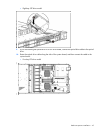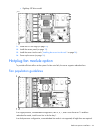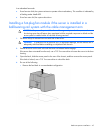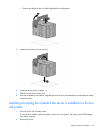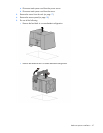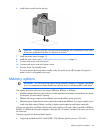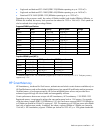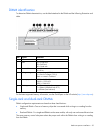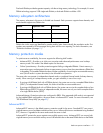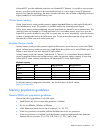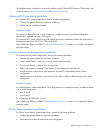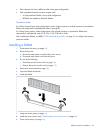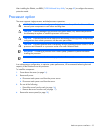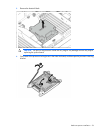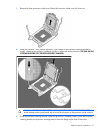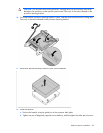
Hardware options installation 51
Dual-rank DIMMs provide the greatest capacity with the existing memory technology. For example, if current
DRAM technology supports 2-GB single-rank DIMMs, a dual-rank DIMM would be 4 GB.
Memory subsystem architecture
The memory subsystem in this server is divided into channels. Each processor supports three channels, and
each channel supports two DIMM slots.
Channel Population order Slot number
1
A
D
1
2
2
B
E
3
4
3
C
F
5
6
DIMM slots in this server are identified by number and by letter. Letters identify the population order. Slot
numbers are reported by ROM messages during boot and for error reporting. For more information, see
"DIMM slot locations (on page 11)."
Memory protection modes
To optimize server availability, the server supports the following AMP modes:
• Advanced ECC—Provides up to 4-bit error correction and enhanced performance over Lockstep
memory mode. This mode is the default option for the server.
• Online Spare Memory—Provides protection against failing or degraded DIMMs. Certain memory is
reserved as spare, and automatic failover to spare memory occurs when the system detects a DIMM that
is degrading. This enables DIMMs that have a higher probability of receiving an uncorrectable memory
error (which results in system downtime) to be removed from operation.
The server also can operate in independent channel mode or combined channel mode (Lockstep Memory
mode). When running in Lockstep Memory mode, you gain reliability in one of two ways:
• If running with UDIMMs (built with x8 DRAM devices), the system can survive a complete DRAM failure
(SDDC). In independent channel mode, this failure would be an uncorrectable error.
• If running with RDIMM (built with x4 DRAM devices), the system can survive the complete failure of two
DRAM devices (DDDC). Running in independent mode, the server can only survive the complete failure
of a single DRAM device (SDDC).
Advanced Memory Protection options are configured in RBSU. If the requested AMP mode is not supported
by the installed DIMM configuration, the server boots in Advanced ECC mode. For more information, see
"HP ROM-Based Setup Utility (on page 82)."
Advanced ECC
Advanced ECC memory is the default memory protection mode for the server. Standard ECC can correct
single-bit memory errors and detect multibit memory errors. When multibit errors are detected using Standard
ECC, the error is signaled to the server and causes the server to halt.
Advanced ECC protects the server against some multibit memory errors. Advanced ECC can correct both
single-bit memory errors and 4-bit memory errors if all failed bits are on the same DRAM device on the DIMM.



